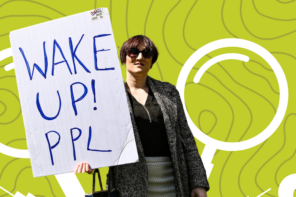Here we are, a week and a half after Democratic presidential candidate Joe Biden became the mathematically inevitable president-elect, and yet Donald Trump’s base continues to push false narratives that Trump “really” won because of non-existent “voter fraud,” or that he will somehow yet prevail. Trump himself, of course, constantly spreads this disinformation and stokes his authoritarian base, which predominantly consists of white Christians, and white evangelicals above all. On Sunday, November 8, Senior Pastor of Eagle Mountain International Church Terri Pearsons thanked God for “giving our administration legal strategies” and exposing “the enemy,” begging, “And Lord, if it be your will and if it be necessary, another election, another voting day.”
Among those on the losing side of the 2020 presidential election, will cooler heads prevail once the dust settles? Despite a handful of visible Republican leaders like former Ohio Governor John Kasich and Senator Mitt Romney recognizing President-elect Biden, and despite the evangelical groups that formed to support Biden before the election, author and expert on the Christian Right Katherine Stewart is right to warn us that Trump’s Christian nationalist supporters are not simply going to quietly accept these election results, and that the political obstruction they engage in so effectively will continue until a president they recognize as “legitimate” rises to power.
Ann and I extend our congratulations to President-elect Joe Biden and Vice President-elect Kamala Harris. We know both of them as people of good will and admirable character. We pray that God may bless them in the days and years ahead.
— Mitt Romney (@MittRomney) November 7, 2020
Of course, within the bounds of American democratic rules, norms, and procedures, Biden won the presidency fair and square, in spite of the disproportionate power granted to Republicans through the undemocratic Electoral College, GOP voter suppression and gerrymandering, and equal representation of all states in the Senate regardless of population. There is no doubt that Biden is the legitimate president-elect, except to those who, for ideological reasons, rule out the very possibility of a Democratic president being legitimate.
I know something about those people. A 1980 baby, I remember how upset my evangelical community was when President Bill Clinton won the 1992 election. People immediately started suggesting that he was or might be the Antichrist, and making “jokes” about his death. The punchline to one of them was “President Gore,” as if the supposed horror captured in that phrase was one reason—presumably the only reason—not to wish for Clinton’s death.
Although both Bill and Hillary Clinton are practicing Christians, most people around me uncritically accepted every baseless conspiracy theory they came across about them. And in 2008 I, now very much an ex-evangelical, watched them do it all again with President Barack Obama, adding “secret Muslim” to the list of wild accusations that once again included being the Antichrist.
So, what’s going on here? Authoritarians may like their authority top-down, but that doesn’t mean they’ll be willing to follow just anyone with some possible claim to authority in their communities. Ideology has its role to play, and, despite their impeccable far-right credentials, Kasich and Romney have long since been labeled “RINOs”—Republicans in name only—by the radicalized GOP base.
Notions of “fake news” and disinformation in the form of “alternative facts,” or something like them, have been linked to claims of illegitimacy in authoritarian communities for a very long time. One major reason for this is that authoritarian leaders tend to rely on a mixture of what Max Weber, a key founding father of modern sociology, identified as “traditional” and “charismatic” authority. The tricky thing about charismatic authority is that it’s inherently fickle and eminently manipulable—and therefore unstable.
Throw concepts of “tradition” into the mix, and, although this claim might initially seem counterintuitive, it’s easy enough to see how rebellion can be essentially conservative. Thus did Martin Luther break with the Catholic Church in an attempt to “purify” and “restore” it. Thus did Emelian Pugachev, the pretender who claimed to be the deposed Tsar Peter III, lead a remarkably persistent Cossack rebellion against Catherine the Great that took the Russian military two years to put down.
We can look back even further. When Mohammed founded Islam, he claimed to be “restoring” the original faith that Jews and Christians had corrupted. Or look at Matthew 7:15, in which Jesus warns his followers against “false prophets, who come to you in sheep’s clothing but inwardly are ravenous wolves,” thereby opening the door to centuries of infighting about who can claim the mantle of “true Christian” and who must be cast out as a “false prophet.”
For America’s Christian Right, which views the world through the dangerous and destabilizing lens of spiritual warfare, Trump is a charismatic authority figure, one about whom many white evangelical leaders claim to have prophesied themselves. Democrats are part of “the enemy,” as illustrated in Terri Pearson’s prayer quoted above, and “the enemy” consists of what Christians of this sort view as literally demonic forces.
In his typology of authority, Weber identified a third model, which he called “bureaucratic” or “legal-rational.” By the standards of that model of authority, the only one that matters according to our constitution, Biden is president-elect. But radical right-wing Christians will no more accept the legitimacy of bureaucratic authority when it fails to get them the result they want than they will listen to authority figures from their own broad community who break with the ideological dictates they hold higher than any particular person. America faces a murky road ahead, but this much is clear: progress will not be made by pretending that unity and compromise are possible with people who regard you as literally evil.





